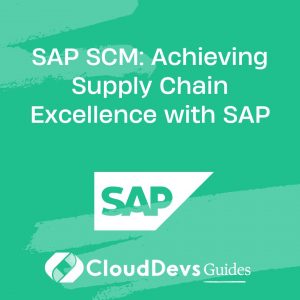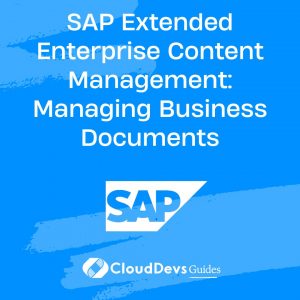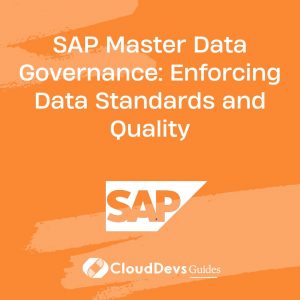SAP SCM: Achieving Supply Chain Excellence with SAP
In today’s fast-paced and ever-evolving business landscape, efficient supply chain management is a critical factor in achieving success. Businesses must ensure that their products and services are delivered to customers seamlessly and at the right time to stay competitive. This is where SAP Supply Chain Management (SCM) comes into play, offering a comprehensive solution that empowers organizations to optimize their supply chain processes and attain excellence. In this blog, we will delve into the world of SAP SCM, explore its key features, and uncover how it can help you achieve supply chain excellence.
1. Understanding Supply Chain Management
Before we dive into SAP SCM, let’s establish a foundational understanding of supply chain management. A supply chain comprises the network of individuals, organizations, resources, activities, and technology involved in the creation and delivery of a product or service from suppliers to customers. Effective supply chain management ensures that every component of this network works harmoniously to meet customer demands efficiently and cost-effectively.
The primary goals of supply chain management include:
- Optimizing Efficiency: Minimizing waste, reducing lead times, and maximizing resource utilization.
- Enhancing Visibility: Gaining real-time insights into the supply chain to make informed decisions.
- Improving Collaboration: Facilitating seamless communication and cooperation among supply chain partners.
- Meeting Customer Demand: Ensuring products are available when and where customers need them.
- Reducing Costs: Identifying cost-saving opportunities while maintaining quality.
2. The Role of SAP SCM
SAP SCM is a powerful suite of applications and tools designed to support supply chain management processes. It enables organizations to plan, execute, and monitor their supply chain activities effectively. Let’s explore how SAP SCM can help you achieve supply chain excellence:
2.1. Demand Planning and Forecasting
One of the key challenges in supply chain management is predicting customer demand accurately. SAP SCM offers advanced demand planning and forecasting capabilities, helping organizations anticipate customer requirements more effectively. By analyzing historical data, market trends, and other factors, SAP SCM assists in generating accurate demand forecasts, allowing companies to align their production and inventory levels accordingly.
python
# Sample demand forecasting code using SAP SCM
import sap_scm
# Load historical data
historical_sales_data = sap_scm.load_data("historical_sales.csv")
# Generate demand forecast
demand_forecast = sap_scm.forecast_demand(historical_sales_data)
# Use demand forecast for production planning
production_plan = sap_scm.create_production_plan(demand_forecast)
2.2. Inventory Management
Optimizing inventory levels is crucial for cost control and ensuring product availability. SAP SCM provides advanced inventory management tools that help organizations maintain the right balance between overstocking and stockouts. By using real-time data and analytics, companies can reduce carrying costs while ensuring products are readily available.
sql -- SQL query to monitor inventory levels with SAP SCM SELECT product_name, current_stock_level FROM inventory WHERE current_stock_level < reorder_point;
2.3. Supplier Collaboration
Collaboration with suppliers is essential for a smooth supply chain operation. SAP SCM facilitates seamless communication and collaboration with suppliers, enabling efficient order processing, tracking, and performance monitoring. This ensures that suppliers are aligned with your production schedules and delivery expectations.
java // Java code for supplier collaboration using SAP SCM import sap_scm; // Send purchase order to supplier sap_scm.send_purchase_order(supplier_id, order_details); // Track order status order_status = sap_scm.track_order_status(order_id); // Monitor supplier performance supplier_performance = sap_scm.evaluate_supplier_performance(supplier_id);
2.4. Transportation Management
Efficient transportation is vital for timely deliveries and cost savings. SAP SCM includes transportation management capabilities that allow organizations to plan, optimize, and track shipments. This not only reduces transportation costs but also enhances delivery reliability.
javascript // JavaScript code for transportation management with SAP SCM import sap_scm_transport; // Plan optimal routes optimal_routes = sap_scm_transport.plan_routes(orders); // Track shipment status shipment_status = sap_scm_transport.track_shipment(shipment_id); // Calculate transportation costs transportation_costs = sap_scm_transport.calculate_costs(shipment_id);
2.5. Analytics and Reporting
Data-driven decision-making is at the heart of supply chain excellence. SAP SCM offers robust analytics and reporting capabilities that provide real-time insights into supply chain performance. These insights help organizations identify bottlenecks, assess risks, and make informed decisions.
sql -- SQL query for supply chain performance analysis SELECT product_name, delivery_time, on-time-delivery FROM order_history WHERE delivery_time > target_delivery_time;
3. Benefits of SAP SCM
Implementing SAP SCM brings a multitude of benefits to organizations striving for supply chain excellence:
3.1. Increased Efficiency
SAP SCM streamlines supply chain processes, reducing manual efforts and errors. This leads to improved operational efficiency and reduced costs.
3.2. Enhanced Visibility
Real-time data and analytics provided by SAP SCM offer unparalleled visibility into supply chain operations, enabling proactive decision-making.
3.3. Better Collaboration
Efficient collaboration with suppliers and partners leads to smoother operations and quicker response to market changes.
3.4. Cost Savings
By optimizing inventory levels, transportation, and production planning, SAP SCM helps organizations save costs significantly.
3.5. Improved Customer Satisfaction
Meeting customer demand accurately and on time results in higher customer satisfaction and loyalty.
4. Key Strategies for Implementing SAP SCM
To achieve supply chain excellence with SAP SCM, consider these key strategies:
4.1. Clear Objectives
Define clear objectives for your supply chain transformation. Identify areas where SAP SCM can make the most significant impact and set measurable goals.
4.2. Engage Stakeholders
Involve key stakeholders from different departments in the implementation process. Their insights and feedback are invaluable for success.
4.3. Robust Training
Provide comprehensive training to your team members to ensure they can fully leverage SAP SCM’s capabilities.
4.4. Continuous Improvement
Regularly assess and refine your supply chain processes to adapt to changing market conditions and customer demands.
4.5. Integration with Existing Systems
Integrate SAP SCM seamlessly with your existing systems and technologies to maximize its benefits.
Conclusion
In conclusion, SAP SCM is a powerful tool that can revolutionize your supply chain management and help you achieve excellence. Its comprehensive features, from demand planning to transportation management, provide the tools you need to optimize your operations, reduce costs, and meet customer demands effectively. By implementing SAP SCM and following the key strategies outlined, your organization can embark on a journey toward supply chain excellence in today’s competitive business landscape. Don’t wait; start your transformation today and stay ahead of the competition.
Remember, supply chain excellence is an ongoing journey of improvement. Embrace the power of SAP SCM to stay agile, competitive, and customer-focused in the dynamic world of modern business.
Now, it’s your turn. Share your thoughts and questions about SAP SCM and supply chain excellence in the comments below!
Table of Contents









